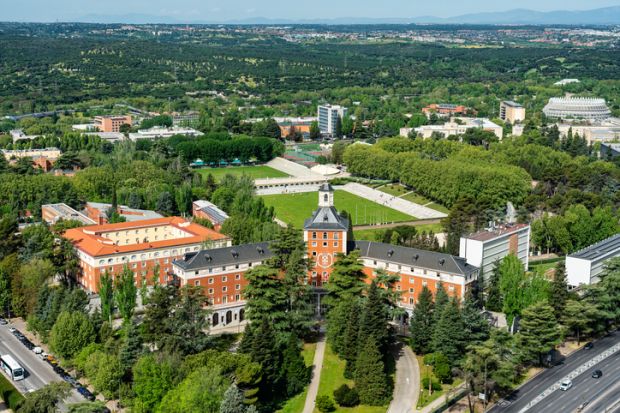Rectors of Madrid’s public universities have lamented “chronic underfunding” that has pushed some institutions to consider cutting courses and others to sell buildings, warning that the region will struggle to compete nationally and internationally if financing does not improve.
Last month, all six rectors addressed an open letter to Isabel Díaz Ayuso, president of the Community of Madrid, stating that the absence of a proposal for more funding for 2025 would “worsen” the “already critical economic situation” of the public universities. After meeting with the rectors, Ms Ayuso’s government announced a 4.2 per cent boost to the universities’ 2025 budget, bringing the total to €47.3 million (£39 million).
“Although these budgetary contributions are essential and welcome, they are still insufficient to guarantee the sustainability of Madrid’s public universities, ensure the quality of our institutions, remedy their chronic underfunding after 15 years without any real increase, and address the necessary investments in infrastructure,” the university leaders said in a subsequent statement.
Amaya Mendikoetxea Pelayo, rector of the Autonomous University of Madrid, told Times Higher Education that public university funding was still lower than it was in 2009 after drastic cuts during the financial crisis, despite gradual recovery since 2015. “With inflation having gone up more than 35 per cent in 15 years, universities are getting poorer every year,” she said. “We can not balance our budgets. Some universities have budget surpluses that they can use, with limitations; others are balancing our budgets by selling buildings.”
The region’s six public universities currently share €7.6 million in annual infrastructure funds; “with that amount of money, we can hardly maintain our buildings,” said Professor Mendikoetxea. “Our facilities are becoming outdated, or even dangerous.”
Antonio José Ramírez Melgarejo and Alfonso Casani Herranz, both assistant professors at the Complutense University of Madrid, as well as researcher Ana Uhia Pérez, told THE that Madrid was “experiencing a chronic deterioration of its university sector”.
The regional government’s outlays for public university employee salaries “consistently fail to meet the required annual salary increases, and the workers’ salaries remain among the lowest in the country, despite Madrid being one of the most expensive cities to live in,” they added. “For students, Madrid has the highest public tuition prices in the country, requiring families and students to make a significantly greater financial effort.”
The Complutense University of Madrid, which had a deficit of €65 million in 2023, has announced that it will consider cutting degrees with the lowest enrolment – a move, the trio said, “that is likely to affect humanities in particular”.
Professor Mendikoetxea said public universities’ difficulties were compounded by a “highly competitive ecosystem” in which private universities were proliferating. “Some of these universities and centres are owned by investment funds, which are pouring in huge amounts of money, giving them the possibility to expand and have top facilities, thus attracting students,” she said.
Madrid’s public universities, meanwhile, were struggling to attract students and researchers or win prestigious research grants, Professor Mendikoetxea said. In their current financial circumstances, it was “impossible to expand to offer new degrees”, while staff have “low motivation, which means they won’t engage in new projects or innovate”.
“Madrid’s universities will surely fall behind in comparison with other Spanish regions and internationally,” she said. “This will only go against our regional government’s ambition to make Madrid an educational and research hub.”
Register to continue
Why register?
- Registration is free and only takes a moment
- Once registered, you can read 3 articles a month
- Sign up for our newsletter
Subscribe
Or subscribe for unlimited access to:
- Unlimited access to news, views, insights & reviews
- Digital editions
- Digital access to THE’s university and college rankings analysis
Already registered or a current subscriber?










